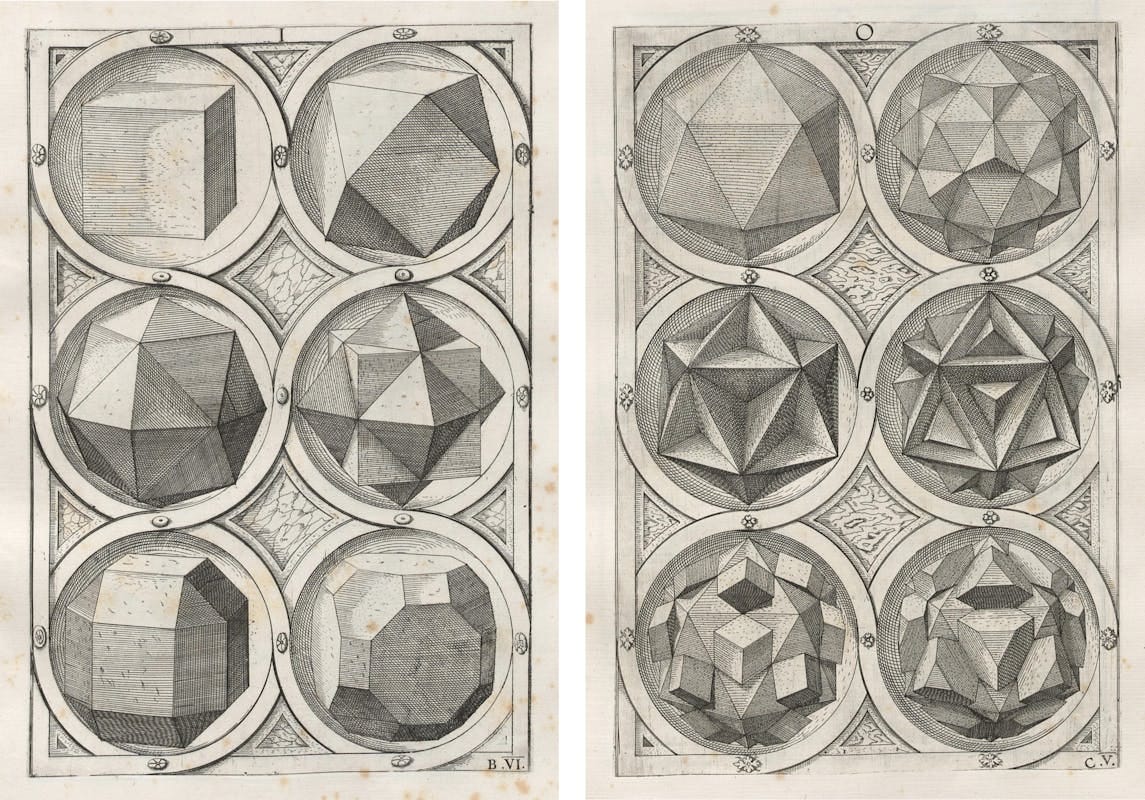Did We Invent Mathematics? Or Did We Discover It?
On the reality (or not) of mathematics
The safest general characterization of the European philosophical tradition is that it consists of a series of footnotes to Plato.
~ Alfred North Whitehead
Does mathematics really exist?
That is to say, do the numbers, geometries, formulae, and so on have any real existence in our world? Is a number as real as a planet, so that we might stumble across one somewhere? Or is mathematics something entirely contained within our minds, and thus merely a tool we invented to describe the world?
Take, for example, a sphere. We all know what spheres are - they are, quite obviously, round things shaped like a ball or a planet. In mathematical terms, we can put this by saying that any point on the surface of a sphere must lie at exactly the same distance from its centre as any other. There are no mountains on a sphere, nor any valleys, nor other imperfections of any kind. A sphere, in the mathematical sense, is a thing of perfection.
Obviously, then, the Earth is not a sphere. Indeed, it doesn't really come close: the Earth has mountains and valleys, it has deep canyons, and even the relatively smooth oceans are constantly shifting and moving. Even worse, the Earth is slightly fatter than it is tall. As our planet spins the equator bulges outwards and the poles flatten. Depending on where you stand, this oblateness can add up to a difference of about twenty kilometres in the Earth's radius.
The Sun is slightly better. It is bigger, of course, and has a stronger gravitational pull. It also spins more slowly, which helps that gravity maintain a spherical form. Yet the Sun too is slightly oblate: measurements show its polar and equatorial radii differ by a bit less than one thousandth of one percent. A small deviation, perhaps, but still, this is no object of mathematical perfection.
As far as astronomy goes, neutron stars might be the closest we can get to such an ideal sphere. These objects are incredibly dense, so much so that our normal laws of physics start to break down and weird things happen to space and time. Some spin extremely fast, and so are not really spherical; but others spin more slowly, and those, physicists think, are within a few millimetres of a true sphere.
Yet the roundest thing in the universe may not have been a star at all: it might, indeed, have been a small sphere of quartz that flew on Gravity Probe B. It was part of a gyroscope used to test Einstein's theory of relativity, and for this purpose it was polished to within ten nanometres of perfection. It thus deviated from a true sphere by less than the width of forty atoms.
Whether some neutron star or black hole out there does slightly better is unknown - but one thing is for sure: there are no perfect spheres in our physical universe.
I. Into The Platonic Realm
That might seem to rule out the physical reality of spheres. And, of course, it is not just true of the sphere: many of the things mathematics talks about - straight lines, triangles, circles - cannot really exist in our world. But that, as Plato wrote millennia ago, doesn't mean they don't have an existence of their own.
Indeed, according to Plato all these mathematical objects really are as real as the Sun or the Moon. But he didn't think these things could be found in our world. Instead they are placed in what we often call the Platonic Realm, a space in which the essences or "Forms" of reality reside.
In this place, the Forms exist in a perfect and timeless state. For example, one might find the perfect sphere there, hanging out with a perfect cube. Alongside them, Plato argued, were other Forms, like those of the colours, of the mountains, of the animals, and even of things like beauty, justice, and truth.
To explain how these Forms relate to the real world, Plato used an allegory of a cave. Humans, he wrote, were like people trapped inside this cave since childhood. Their legs and necks were placed in chains, and so bound they were unable to see anything other than the cave’s inner walls. Outside, however, a great fire roared, and in front of the flames the Forms were paraded.
The shadows of these Forms thus played on the walls of the cave. Plato argued that the humans trapped within, who knew nothing of the outside world, would mistake these shadows for reality. We, he said, are like this: mistaking our imperfect world for reality, while all along the real thing actually lies in the Platonic Realm.
The belief in this kind of thing is today called Platonism. Broadly speaking, it means a belief in some kind of external and eternal reality of mathematics. That is, it is a belief that perfect spheres are as real as the planet Saturn; and that we - or, rather mathematicians - are only exploring this reality, rather than inventing it.
In this belief, things like the Pythagoras Theorem or, say, the Riemann Zeta Function, exist somewhere beyond our world. They have always existed, and have done so whether we knew of their existence or not. And just as European explorers discovered the unknown continents of the Americas, so are we merely discovering the realm of mathematics.
II. The Discovery of Mathematics
That might seem pretty far out there, and you might be wondering why we should listen to some long dead philosopher anyway. But there are some strong arguments in favour of the idea.
Perhaps the strongest is the universal nature of mathematics. An alien scholar, working on some planet in another galaxy, would likely encounter and use the same mathematical rules that we do. In this sense mathematics is rather unique: it would be shocking to encounter aliens speaking English, but much less surprising if they told us the digits of pi.
That universality springs from the way mathematics seems to be embedded in the inner workings of the universe. First, it seems, numbers and geometries emerge from basic observations about patterns in nature. But having emerged, they then take on a life of their own.
Take, for example, the ellipses and conic sections sketched out by the Ancient Greeks. They studied them in order to solve various mathematical problems - but, as far as they knew, they had limited use in physics. Yet two thousand years later Kepler found those same ellipses and conic sections described the orbits of the planets and comets.
More fundamentally, there seems to be some kind deep effectiveness about mathematics. Physicists have puzzled about why this is for centuries. How was it possible, for example, that a set of equations written by Maxwell in the 1860s was able to predict the discovery of radio waves two decades later? Or that Dirac, puzzling over the mathematics of relativity and quantum theory, was able to conceive of antimatter long before any antiparticles were found? How is it that mathematics has this almost magical predictive power about nature?
It might seem, then, that mathematics is built into the fabric of the universe. If so, we can hardly claim to have invented it. Instead we have derived it from observations about the world, and then gone on to discover the great landscapes that lie beyond those first principles. And as a result, we have simultaneously explored the mathematical laws waiting in the Platonic Realm.
III. The Problem With Elegance
And yet, there are problems. For one thing, there still aren't any perfect spheres in the universe. And neither are the orbits of the planets perfect ellipses. Over centuries they drift, pulled under the influence of the other planets, of passing stars, and of an uneven accumulation of comets and asteroids.
Over long time periods, indeed, the very stability of the solar system is uncertain. It is a chaotic system - and that is something that mathematics cannot forecast, any more than it can accurately predict the ups and downs of the stock market or the future thoughts of a human mind.
Kepler's ellipses, then, are only approximations of reality. But they are in turn derived from deeper laws - those of Newton, and also, with some minor alterations, those of Einstein. They too might be approximations - although so far, it must be admitted, we have found few deviations from the predictions of Einstein.
Plato, of course, would have argued the opposite. Nature, to him, was only an approximation of the Platonic Realm. But then, what exactly does lie in that Platonic Realm? Is it everything mathematical, or is it only the mathematics that applies to our world? And how is the distinction made? There are, as yet, no real answers to these questions.
Indeed, there have been many descriptions of the world that were abandoned when better ones came along. Some of those lost theories were mathematically very elegant. The Ptolemaic System, which put the Earth at the centre, had a mathematics of its own, as did an attempt by Descartes to explain planetary motion by means of cosmic vortices.
Mathematics, it seems, extends far beyond the reality around us. Some of it may in time prove useful to future theories of physics. But not all of it will. Mathematical elegance, when it stands alone, is a poor guide to the nature of reality.
Yet even today scientists sometimes forget that. The last few decades of fundamental physics, for example, have been spent on a fruitless chase for string theory and supersymmetry. Both theories are mathematically beautiful, yet neither seems to describe the universe we live in. Possibly, some have said, they describe others. Maybe. But in the end, is such an idea really all that different to Plato's realm of ideal forms?





Taking this moment to thank you for the wonderful job you do here in this space.
That's an interesting question. It refers I think to Platonism in the Philosophy of Mathematics. When one accepts the ideas existence independent of the "observer", then, it is discovery. When Mathematical objects do not exist without the action of the mathematician, then it's construction.
Perhaps some advertising of ny own work is allowed. If consistency is a hallmark of existence-as in some views on mathematical objects- then concrete mathematical incompleteness destroys this view.
J.F. Geurdes, Riemann Zeta function on the real axis, Lobachevskii J of Mathematics, 46(3), 1266-1270, 2025.
I think that this discovery of inconsistency in mathematics points in the direction of "Mathematical objects are discovered."
Thank you.